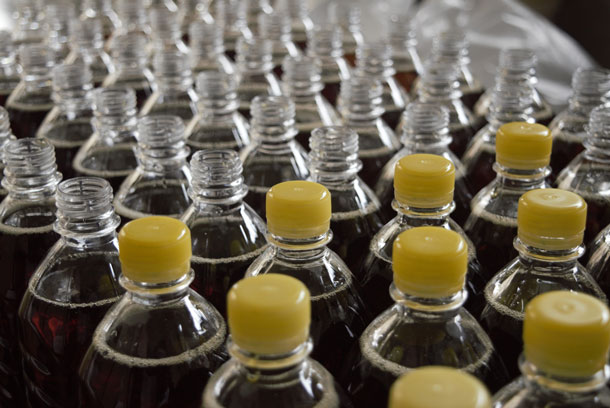Beyond the Headlines
Air Date: Week of February 9, 2018

A new EPA plan may undermine toxicity evaluations of pesticides, industrial emissions, and radioactive materials. (Photo: veeterzy, Unsplash)
Peter Dykstra and host Steve Curwood examine recent developments in the Trump administration that undermine the regulation of toxic products. Plus, the duo discusses a withdrawn appointment to the Council on Environmental Quality and the USDA’s choice of a corn syrup lobbyist to help craft dietary guidelines. For the history lesson, Peter reminds us of a Clinton-era Executive Order meant to improve environmental justice.
Transcript
CURWOOD: It’s Living on Earth, I’m Steve Curwood. Let’s check in with Peter Dykstra beyond the headlines in Atlanta Georgia now. Peter’s with Daily Climate dot org and Environmental Health News, that’s ehn.org and he’s on the line – how’s it going, Peter?
DYKSTRA: I’m doing well, Steve - hi. Let’s travel to Washington, DC, or as President Trump likes to call it, “The Swamp.” You got your boots on?
CURWOOD: Well, we were informed that the swamp might be drained by now, but if it’s not I think we’re going to need more than boots, I think we’ll need something more like waders. I’m ready when you are!
DYKSTRA: Right. First stop, the U.S. Environmental Protection Agency, where, shall we say, non-native species have taken over in the past year. A tiny EPA office called the Integrated Risk Information System – or IRIS – is under attack, and may disappear or get totally pulled under.
CURWOOD: So what does this Risk Information System, what does this IRIS thing do?
DYKSTRA: IRIS acts as an independent evaluator of how toxic certain products are – pesticides, industrial emissions, radioactive materials – in order to inform regulators at EPA on how to proceed. But the current EPA plan would put IRIS under the control of the regulators – specifically an EPA office now run by a former chemical industry lobbyist.
CURWOOD: Sounds to me like that classic case of the fox guarding the henhouse, Peter.

The USDA waived part of the Ethics Pledge requirements for Kailee Tckaz, who previously lobbied for the corn syrup industry. (Photo: Arshad Pooloo, Unsplash)
DYKSTRA: Or maybe the classic case of nobody guarding anything at all. But on to another development from the Trump Administration.
Kathleen Hartnett White, a top environmental regulator in Texas, withdrew her nomination to be the chair of the White House Council on Environmental Quality. Ms. White’s Texas tenure was marked by a steadfast denial that climate change was a problem, and remarkably, a declaration that fossil fuels were responsible for ending slavery.
CURWOOD: Okay, Peter. All right, so remind us what the Council on Environmental Quality, what’s the CEQ supposed to do?
DYKSTRA: Well, the CEQ chair is considered to be the President’s top environmental advisor, and the agency acts, theoretically, as a bridge between other government agencies and departments to make sure that environmental concerns are a priority.
Kathleen Hartnett White’s nomination died once last year, President Trump re-nominated her, but it was clear that virtually all Democrats and quite a few Republicans were having none of it. And one more quick news item from the Swamp.
CURWOOD: Okay, fire away…..
DYKSTRA: If you can’t fully drain the swamp, fill it with delicious, beautiful, clean corn syrup!
CURWOOD: Well, that would be quite a swamp. How do you do that?
DYKSTRA: The White House legal office issued a special waiver to ethics laws to let a former corn syrup lobbyist who just took a job at the Agriculture Department sign on to the USDA’s five-year effort to set national dietary guidelines. Corn syrup is of course the ubiquitous and magical sweetener that’s in our sodas and many other products. It’s been linked to obesity, diabetes, and many other health problems.
CURWOOD: Oh boy, I can’t wait to see those new guidelines. Hey Peter, let’s take a look back now at environmental history, what do you have for us this week?
DYKSTRA: Well on February 11, 1994, President Bill Clinton signed a sweeping Executive Order mandating that all projects using Federal funds take account of environmental justice – the huge and disproportionate impact that polluting projects have on poor and minority communities. Despite the best of intentions, nearly a quarter century later, environmental justice still takes a back seat in public and private projects.
CURWOOD: Yeah I mean, we were just hearing about high levels of pollution in schools in poor and minority areas. I guess the neglect that led to the drinking water crisis in Flint, Michigan demonstrates that as well.
DYKSTRA: Yeah, Flint and literally hundreds of other communities – whether they’re Federal projects or not, we’re still predominantly dumping on America’s poor and minorities.
CURWOOD: Yeah, but don’t hold your breath waiting for a new toxic landfill or diesel truck terminal to be built in, let’s say, Beverly Hills.

An Executive Order signed in 1994 mandates that all projects using Federal funds take into account issues of environmental justice. (Photo: Mark Dixon, Flickr CC BY 2.0)
DYKSTRA: Well, wherever they’re built, holding your breath is a good idea.
CURWOOD: Yeah, I guess so. Peter Dykstra is with environmental health news, that’s EHN dot org and Daily Climate dot org – thanks Peter!
DYKSTRA: Alright, Steve, thanks a lot. Talk to you soon!
CURWOOD: And if you want to check out these stories, there’s more about them on our website LOE.org.
Links
International Business Times: “Corn syrup lobbyist helping set USDA dietary guidelines”
Living on Earth wants to hear from you!
Living on Earth
62 Calef Highway, Suite 212
Lee, NH 03861
Telephone: 617-287-4121
E-mail: comments@loe.org
Newsletter [Click here]
Donate to Living on Earth!
Living on Earth is an independent media program and relies entirely on contributions from listeners and institutions supporting public service. Please donate now to preserve an independent environmental voice.
NewsletterLiving on Earth offers a weekly delivery of the show's rundown to your mailbox. Sign up for our newsletter today!
 Sailors For The Sea: Be the change you want to sea.
Sailors For The Sea: Be the change you want to sea.
 The Grantham Foundation for the Protection of the Environment: Committed to protecting and improving the health of the global environment.
The Grantham Foundation for the Protection of the Environment: Committed to protecting and improving the health of the global environment.
 Contribute to Living on Earth and receive, as our gift to you, an archival print of one of Mark Seth Lender's extraordinary wildlife photographs. Follow the link to see Mark's current collection of photographs.
Contribute to Living on Earth and receive, as our gift to you, an archival print of one of Mark Seth Lender's extraordinary wildlife photographs. Follow the link to see Mark's current collection of photographs.
 Buy a signed copy of Mark Seth Lender's book Smeagull the Seagull & support Living on Earth
Buy a signed copy of Mark Seth Lender's book Smeagull the Seagull & support Living on Earth

